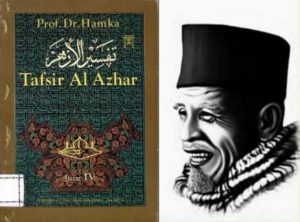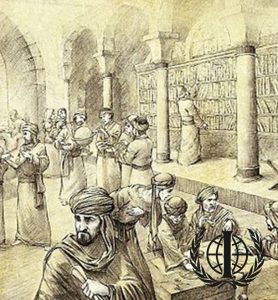Ahmad Farouk Musa & Piet Hizbullah Khaidir || 13 March 2024
Islamic Reformism via Neo-Mu’tazilism
 Indeed, the main challenge confronting us today is the same one the past reformists faced: intellectual stagnation. As a result of the decline in rationalism among modern Muslims, we witness the decay of the Islamic world today after being a great civilisation at a time when the West was still in the dark ages. We produced thousands of scientists, physicists, mathematicians, chemists, astrologists and physicians, and excelled in many disciplines established at the House of Wisdom (Baitul Hikmah) in the Mu’tazilite era. Sadly, those achievements are now fondly remembered only as distant history.
Indeed, the main challenge confronting us today is the same one the past reformists faced: intellectual stagnation. As a result of the decline in rationalism among modern Muslims, we witness the decay of the Islamic world today after being a great civilisation at a time when the West was still in the dark ages. We produced thousands of scientists, physicists, mathematicians, chemists, astrologists and physicians, and excelled in many disciplines established at the House of Wisdom (Baitul Hikmah) in the Mu’tazilite era. Sadly, those achievements are now fondly remembered only as distant history.
The Mu’tazilites consider tawhid—alongside divine justice (‘adl)—at the core of their theological reflection, defining themselves as ahl al-ʿadl wa al-tawḥīd or “the people of justice and unity.” They believed that one of the principal traits of God is justice, which is embodied in their uṣūl al-khamsah (five principles) or one of the five principles of their doctrine as explained earlier. Being Just, God gave man freewill in the form of reason that he could use to differentiate between right and wrong, and to strive to uphold justice.
For the Mu’tazilites, a Just God will not respond to good and bad human deeds arbitrarily. Man will receive God’s response be it the blessings of heaven or the torture of hellfire as a result of the choices he made based on his own freewill. Thus, as the maker of his own actions, man is responsible for whatever response God gives him. This position conflicts with what has been extracted from works of the Ash’arites. For them, God is the most Compelling; He may cast someone who is pious and just into the hellfire and place someone who is cruel and evil into heaven. That, the Ash’aritesexplain, is the reality behind the power of God who is the most Compelling and the most Powerful.
Conversely, according to the Mu’tazilites, God is Just and cannot be an irrational dictator. This theological dispute has been carried to the present day after being passed on from generation to generation. From this perspective, we can appreciate the struggle of Muslim reformists such as Harun Nasution. In fact, this problem was first realised by Muhammad Abduh in the late 18th and early 19th centuries when he assessed that the umma has declined with its thoughts fossilized. According to Abduh, this decline was caused by the abandonment of ijtiḥād (independent reasoning)in favour of taqlīd (the blind imitation of past scholars). Similar to Nasution in the 20th century, the revival of rationalreasoning was Abduh’s lifelong goal. In fact, it would not be far-fetched to characterize the emergence of Nasution as a resurgence of neo-Mu’tazilism.
Indeed, Muhammad Abduh (1849–1905) had the most profound impact on Nasution’s thought. As the latter wrote in his 1968 PhD dissertation on rationalism in the theology of the Egyptian reformer Muhammad Abduh, Abduh promotes “a Mu‘tazili theological system with almost identical theological doctrines” (Nasution, 1969, pp. 263-267). Although Nasution translated his thesis at a much later stage into Indonesian, he took it upon himself to propagate Abduh’s idea of rationalism in Indonesia. He somehow managed to spread Abduh’s reformist idea far and wide in the Nusantara. Not surprisingly, Nurcholish Madjid’s (1939-2005)—a proponent of modernization within Islam—fitting description of Nasution’s ideology as Abduhisme, celebrating the latter’s intellectual prowess in disseminating the idea of Islamic reformism via neo-Mu’tazilism (Madjid, 1989, pp. 102-110).
In Nasution’s mind, the idea that the Qur’an is absolute, eternal and immutable does not mean that it describeseverything in detail for human life (Nasution, 1995, pp. 27-28). The absolute and immutable are within the realm of ʿaqīda (creed) and ʿibāda (religious rituals) or what is known as al-thawābit (the absolute, immutable). However, a larger sphere exists that requires human reasoning in the field of al-mutaghayyirāt (the changing, relative), which includes economy and politics. Nasution emphasizes Qur’an as a revelation that encourages the use of reason or intellect. Of course, the main thrust of the Qur’an is on creed or ʿaqīda but where the Qur’an is silent, we need to use our intellect or human reasoning although some details can be found in the Sunna.
Mohammed Abdul Haleem, an expert in Qur’anic studies, also asserted that the main thrust of the Qur’an is on ʿaqīda or creed (Haleem, 2017, p. 243). Hence, Nasution believes that the Qur’an would leave certain particulars to bedeliberated by human beings themselves, based on the concept of al-thawābit (the absolute, immutable) and al-mutaghayyirāt (the changing, relative) explained above. He criticizes those who hold the idea that the Qur’an contains everything and explains everything, a category that includes many contemporary Islamists for whom the Qur’an is a complete text with even the finer details fully elaborated for mankind to implement in their lives and in their country’s constitution (Nasution, 1982, p. 31).
 Interestingly, a renowned Islamic scholar in Indonesia, Haji Abdul Karim Amrullah (Hamka) (1908-1981), theauthor of the famous Tafsir Al-Azhar—an exegesis of the Qur’an in Indonesian language—shared a similar view to Nasution. Both of them believed in the necessity of reviving rationality through the Qur’an, and they drew their ideas from the exegesis ofAl-Zamakshari (1075–1144), a Mu’tazilite theologian and an interpreter of the Qur’an. To Hamka, as to Nasution, theQur’an was not revealed as an ever-encompassing text. Rather, it exhorts its readers to use their intellect to search for non-revealed truths about life and the universe (Hamka, 1982, p. 275).
Interestingly, a renowned Islamic scholar in Indonesia, Haji Abdul Karim Amrullah (Hamka) (1908-1981), theauthor of the famous Tafsir Al-Azhar—an exegesis of the Qur’an in Indonesian language—shared a similar view to Nasution. Both of them believed in the necessity of reviving rationality through the Qur’an, and they drew their ideas from the exegesis ofAl-Zamakshari (1075–1144), a Mu’tazilite theologian and an interpreter of the Qur’an. To Hamka, as to Nasution, theQur’an was not revealed as an ever-encompassing text. Rather, it exhorts its readers to use their intellect to search for non-revealed truths about life and the universe (Hamka, 1982, p. 275).
During his lifetime, Nasution realised the existence of two trends among Muslims that he found alarming: secularism and fatalism. Both of these theologies have shaped the Muslims’ view of their future in a globalized world (Ishak, 2009, pp. 39-51). On the one hand, the secularist theology sidelined God and claimed that the progress of mankind depends on man alone without any guidance from religious texts, a view that Nasution believes would lead to destruction of civilisation itself (Nasution, 1985, p. 41). On the other hand, the fatalist theology, which is the more common ideology among Muslims in the Nusantara who adheres to the Ash’arite school, relies heavily on predetermination such that makingany effort to change one’s destiny is a vain pursuit: no matter how hard we try, what is fated cannot be changed. This explains why Muslims often end up as the most backward people, if not the most unproductive in their contribution to science and technology.
This is where Nasution offered an alternative theology which he felt could change, especially in the Nusantara, the way Muslims think and act (Nasution, 1982, p. 6). He called it the theology of divine constants, which can also be referredto as the rational theology. It is a theology that recognises God as the originator of the natural laws (sunnatullāh) of the universe (Nasution, 1972, pp. 150-151). Divine constants, which include laws of gravity, entropy and so on, are scientific laws governing the universe; they are timeless and cannot be changed, as ordained by God Himself. This rationalist philosophy brought the Mu’tazilites to contend that God, and the firmaments of His creation, should operate in accordance with rational rules that He himself has created. It was this view that successfully spurred Muslims towards scientific research and to the pinnacle of scientific excellence in various disciplines.
This realm operates through a system that is determinate in as much as it is orderly, where everything functions in an organised manner, from the smallest atoms to the biggest planets and stars that revolve in their respective orbits. All of them revolve in a manner that is neatly arranged by the divine natural rules that are entirely pure, many of them with mathematical properties. Thus, water will boil at 100°C and it will freeze at 0°C; everything that is thrown from above will land on the ground due to the attractive force of gravity. All of these are the natural laws of the universe created by God. Only when we understand and study these natural laws and universal rules can we understand how a particular phenomenon occurs based on scientific knowledge, knowledge that itself originates from God. By pursuing and equipping ourselves with such scientific knowledge, we may bring about civilisational progress.
During their heyday, the Mu’tazilites deeply understood these natural laws. They pursued knowledge from the East and the West, translated new scientific ideas and improved upon them without discriminating against knowledge emanating from people from other cultures, civilisations, and belief systems. Accordingly, they excelled in all fields of knowledge which led to the construction of the House of Wisdom. They were the people that held firmly to the rational theory that everything that happens must be in accordance with the natural laws determined by God, which in modern language translates as scientific knowledge.
Sadly, Muslims influenced by the Ash’arite doctrine assume that God can even do whatever conflicts with the natural law simply because He is the most Compelling. Thus, His power does not require Him to abide by the natural laws that He created, in the same manner that He is empowered to cast someone pious into hellfire or to place an evil person in heaven.
Conclusion
 Indeed, the advent of Islam shook Arabia and freed its people from endless tribal conflicts. Within the span of a few decades, the Qur’an spread its worldview across the Arabian borders and gave birth to the first ever borderless ideological community in history through its insistence on awareness and knowledge. It enlivened amongst its followers the enthusiasm to seek knowledge based on rationalism and the natural laws, which brought the Islamic world to its zenith. The culture pioneered by the Mu’tazilites penetrated medieval European thought in many ways and through many paths. Ultimately, it sparked a revolution in European culture called the Renaissance, which played a major role in giving rise to the scientific age in which we live today. Only by reigniting the scientific spirit can we return to the glory of our predecessors. Even though Nasution’s ideas did not translate into a mass movement, his idea of Islamic rationality has been dearly embraced by some circles of the Muslim intelligentsia in the Nusantara (Salleh, 2001, p. 197).
Indeed, the advent of Islam shook Arabia and freed its people from endless tribal conflicts. Within the span of a few decades, the Qur’an spread its worldview across the Arabian borders and gave birth to the first ever borderless ideological community in history through its insistence on awareness and knowledge. It enlivened amongst its followers the enthusiasm to seek knowledge based on rationalism and the natural laws, which brought the Islamic world to its zenith. The culture pioneered by the Mu’tazilites penetrated medieval European thought in many ways and through many paths. Ultimately, it sparked a revolution in European culture called the Renaissance, which played a major role in giving rise to the scientific age in which we live today. Only by reigniting the scientific spirit can we return to the glory of our predecessors. Even though Nasution’s ideas did not translate into a mass movement, his idea of Islamic rationality has been dearly embraced by some circles of the Muslim intelligentsia in the Nusantara (Salleh, 2001, p. 197).
Biblioraphy
Abdullah, M. A. (1996). Studi Agama: Normativitas atau Historisitas? Yogyakarta: Pustaka Pelajar.
Ali, M. (2019). Harun Nasution. Retrieved February 7, 2020, from Oxford Islamic Studies Online
Braun, J. (2017). A Critique of Max Horkheimer’s Critique of Instrumental Reason. The American Sociologist, 48(2), 192–207.
Haleem, M. A. (2017). Exploring the Qur’an: Context and Impact. London: I. B. Tauris.
Hamka. (1982). Tafsir Al-Azhar Vol. 1. Jakarta: Pustaka Panjimas.
Hasbiansyah, O. (2008). Pendekatan Fenomenologi: Pengantar Praktik Penelitian dalam Ilmu Sosial dan Komunikasi. Mediator: Jurnal Komunikasi, 9(1), 163-180.
Husserl, E. (1965). Phenomenology and the Crisis of Philosophy: Philosophy as Rigorous Science. New York: Harper & Row.
Imarah, M. (1988). Mu’tazilah wa Mushkilah al-Hurriyah al-Insaniyah. Cairo: Dar al-Syuruq.
Imarah, M. (2020). Mu’tazlah dan Persoalan Kebebasan Insan. Kuala Lumpur: Islamic Renaissance Front.
Ishak, M. S. (2009). Islamic Rationalism: A Critical Evaluation of Harun Nasution’s Thought. Gombak: IIUM Press.
Jamal, K. (2020). Hadits dalam Pandangan Harun Nasution. Retrieved February 7, 2020
Lyons, J. (1985). Phenomenology. In Encyclipaedia Britannica. Chicago: University of Chicago Press.
Madjid, N. (1989). Abduhisme Pak Harun. In Panitia Penerbitan Buku dan Seminar, Refleksi Pembaharuan Pemikiran Islam: 70 Tahun Harun Nasution (pp. 102–110). Jakarta: Lembaga Studi Agama dan Filsafat.
Mujani, S. (1994). Mu’tazilah Theology and the Modernization of the Indonesian Muslim Community: Intellectual Portrait of Harun Nasution. Studia Islamika, 1(1).
Nasution, H. (1969). The Place of Reason in ‘Abduh’s Theology: Its Impact on his Theological System and Views. Montreal: McGill University.
Nasution, H. (1972). Teologi Islam: Aliran-aliran, Sejarah, Analisa Perbandingan.Jakarta: UI Press.
Nasution, H. (1973). Falsafah dan Mistisisme dalam Islam. Jakarta: Bulan Bintang.
Nasution, H. (1982). Akal dan Wahyu dalam Islam. Jakarta: Penerbit Universitas Indonesia.
Nasution, H. (1985). Perkembangan Modern dalam Islam. Jakarta: Yayasan Obor.
Nasution, H. (1987). Muhammad Abduh dan Teologi Rasional Muktazilah. Jakarta: UI Press.
Nasution, H. (1995). Islam Rasional: Gagasan Dan Pemikiran. Bandung: Penerbit Mizan.
Peta, I. (2022). Aḥmad Amīn’s Rationalist Approach to the Qur’ān and Sunnah. Religions, 13(3: 234), 1-15. doi
Riddell, P. G. (2001). Islam and the Malay-Indonesian World: Transmission and Responses . Hawaii: University of Hawaii Press.
Sadic, R. (2022). Abdolkarim Soroush’s Pluralistic Philosophy of Religion. Synthesis Philosophica, 73(1), 223-235.
Salleh, F. (2001). Modern Trends in Islamic Theological Discourse in the 20th Century Indonesia: A Critical Survey. Leiden: Brill.
Saude. (2011). Pemikiran Harun Nasution Tentang Mistisisme Dalam Islam (Disertasi). Makassar : UIN Alauddin Makassar.
Soroush, A. K. (2000). Reason, Freedom, & Democracy in Islam: Essential Writings of ‘Abdolkarim Soroush. Oxford: Oxford University Press.
Syakur, A. (2018). Polemik Harun Nasution dan HM Rasyidi Dalam Mistisisme Islam. Ulul Albab, 19(2).
Thahir, L. S. (2003). Harun Nasution (1919-1998) Interpretasi Nalar Teologi dalam Islam. Yogyakarta: Program Pascasarjana IAIN Sunan Kalijaga.
Watt, W. M. (1985). Islamic Philosophy and Theology. Edinburgh: Edinburgh University Press.
 Dato’ Dr Ahmad Farouk Musa is an academician & researcher at Jeffrey Cheah School of Medicine & Health Sciences, Monash University Malaysia. He is also the Founder & Director of Islamic Renaissance Front, Kuala Lumpur. ORCID ID: 0000-0002-2303-7813.
Dato’ Dr Ahmad Farouk Musa is an academician & researcher at Jeffrey Cheah School of Medicine & Health Sciences, Monash University Malaysia. He is also the Founder & Director of Islamic Renaissance Front, Kuala Lumpur. ORCID ID: 0000-0002-2303-7813.
 Dr Piet Hizbullah Khaidir is a Director, Sekolah Tinggi Ilmu al-Qur’an & Sains Al-Ishlah (STIQSI), Lamongan, Jawa Timur. ORCID ID: 0009-0002-5517-8132.
Dr Piet Hizbullah Khaidir is a Director, Sekolah Tinggi Ilmu al-Qur’an & Sains Al-Ishlah (STIQSI), Lamongan, Jawa Timur. ORCID ID: 0009-0002-5517-8132.
This manuscript was first published in a SCOPUS-Indexed journal Intellectual Discourse at https://doi.org/10.31436/id.v31i2.2054

